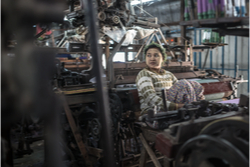 In 2020, a Times investigation alleged that a well-known online fashion giant’s wholly-owned subsidiary was using modern slavery in its Leicester factory, paying staff as little as £3.50 an hour to work in very poor conditions.
In 2020, a Times investigation alleged that a well-known online fashion giant’s wholly-owned subsidiary was using modern slavery in its Leicester factory, paying staff as little as £3.50 an hour to work in very poor conditions.
The case demonstrates that modern slavery isn’t just a problem for murky companies overseas – major brands in the UK can also be associated with the practice. While this example is unusual, once global supply chains are considered, many more UK businesses could be unwittingly supporting modern slavery around the world.
40 million victims
Globally, over 40 million men, women and children are trapped in modern slavery. In the UK, a National Referral Mechanism has been established to help identify and refer potential victims. And the war in Ukraine has put even more people at risk of exploitation.
Every organization has a role to play in eradicating modern slavery. In addition to the appalling human suffering involved, modern slavery represents a reputational and operational risk that no business can afford to overlook. To support anti-modern slavery initiatives, BSI developed BS 25700 Organizational responses to modern slavery which is freely available on an open access basis.
What is modern slavery?
Slavery is an emotive word and you might think your company is a million miles away from involvement but how confident can you be about your complete supply chain?
Modern slavery involves a victim being coerced into an activity that benefits a third party but not themselves. For example, you might tour a factory that is tendering to supply your organization. But it’s possible that the workers who, from all appearances seem ordinary, might actually be labouring under conditions of enslavement, trapped by debts, or threatened with violence or deportation if they speak out.
When long, complex supply chains are involved, it is even more difficult to oversee working conditions. You might be confident in the standards of your direct partners, but downstream supply chain practices could be less scrupulous.
Modern slavery can be hard to quantify as it is often a hidden crime. However, it is increasingly reaching the public consciousness and with the legal framework due to be tightened – it is not an issue that organisations can afford to overlook.
Rooting out modern slavery in your supply chain
Referrals of modern slavery are on the increase, rising from 2,340 in 2014 to over 10,000 in 2020. Around 41% of victims in the UK are exploited for their labour, and the most common sectors for labour exploitation are food processing, factory work, construction, car washing, agriculture and tarmacking. Few sectors are immune however, and for the vast majority of UK businesses, modern slavery will occur in the supply chain rather than directly employed staff.
Whether your company purchases electronic components that could contain cobalt mined by children, or coffee picked by indentured labour, our globalised economy and extended supply chains have increased the risk of modern slavery, and organizations need to take increasing ownership of this crime. Supply chains can be complex, but organisations are now looking to do all they can to address the risk of modern slavery, including where they function through franchise models and subsidiary company structures.
The importance of taking action
Companies with an annual turnover of £36m or more are required by law to issue annual statements on modern slavery - and there are proposals to expand reporting duties. But besides being the legal (and moral) thing to do, responding proactively to the risk of modern slavery can help increase staff retention, improve investor confidence and build supply chain resilience.
Reputational damage is also a key consideration
Companies associated with modern slavery can incur severe damage to their brand. Detailed reporting on Environmental, Social and Governance (ESG) issues can help demonstrate a responsible, transparent approach to dealing with modern slavery.
How BS 25700 can help mitigate the risk of modern slavery
BS 25700 Organizational responses to modern slavery – Guidance provides organisations of all sizes and sectors a structured approach to managing the risk of modern slavery .
This British Standard provides organizations with guidance for managing modern slavery risk in its operations, supply chains and its wider operating environment. It uses a risk-based approach to help organizations understand the risk of modern slavery, to manage and reduce this risk as part of its legal and non-legal frameworks, and go beyond its legal and statutory duties
BSI is committed to the UN Sustainable Development Goals (SDGs). This standard contributes to a number of SDGs but in particular supports SDG 8.7: End Modern Slavery, Trafficking and Child Labour. To support change in such an important area, BSI has made BS 25700 freely available on an open access basis.
The benefits of using BS 25700 include:
- A holistic, people-first approach to modern slavery
- Effective risk management that supports human rights due diligence
- Demonstration of organizational commitment to ESG
- Supporting your brand values and business reputation
- Ethical credentials leading to increased sales and customer loyalty
- Greater ability to attract and retain skilled employees
- More responsive and stable supply chains
The standard can be applied to all types and sizes of organizations. Any organization can be implicated in modern slavery practices and any organization can sustain severe reputational damage from failing to exclude modern slavery from its supply and value chains.
To discover more about the risks of modern slavery and to learn about how BS 25700 can help you respond, register to watch our recent on-demand webinar.
Or listen to this Eradicating Modern Slavery BSI podcast here.

 In 2020, a
In 2020, a 